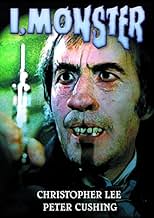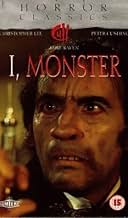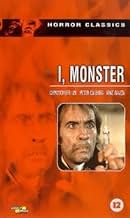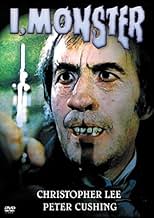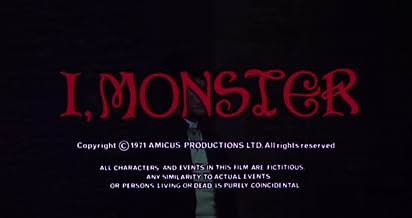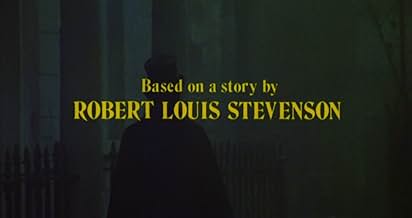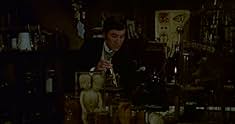IMDb रेटिंग
5.7/10
2.1 हज़ार
आपकी रेटिंग
अपनी भाषा में प्लॉट जोड़ें19th-century London psychologist Charles Marlowe experiments with a mind-altering drug. He develops a malevolent alter ego, Edward Blake, who his friend Utterson suspects of blackmailing Mar... सभी पढ़ें19th-century London psychologist Charles Marlowe experiments with a mind-altering drug. He develops a malevolent alter ego, Edward Blake, who his friend Utterson suspects of blackmailing Marlowe.19th-century London psychologist Charles Marlowe experiments with a mind-altering drug. He develops a malevolent alter ego, Edward Blake, who his friend Utterson suspects of blackmailing Marlowe.
- निर्देशक
- लेखक
- स्टार
Aimée Delamain
- Landlady
- (as Aimee Delamain)
Jim Brady
- Pub Patron
- (बिना क्रेडिट के)
Chloe Franks
- Girl in Alley
- (बिना क्रेडिट के)
Lesley Judd
- Woman in Alley
- (बिना क्रेडिट के)
Ian McCulloch
- Man At Bar
- (बिना क्रेडिट के)
Reg Thomason
- Man in Pub
- (बिना क्रेडिट के)
Fred Wood
- Pipe Smoker (with Cap) in Pub
- (बिना क्रेडिट के)
फ़ीचर्ड समीक्षाएं
"I, Monster" is a respectable adaptation of the classic Robert Louis Stevenson tale of Jekyll & Hyde, albeit with some unconventional touches by screenwriter Milton Subotsky. Sir Christopher Lee stars as Dr. Marlowe, a psychiatrist / researcher who experiments with drugs, trying to get his patients to release their inhibitions. But when he tests his serum on himself, the results are predictable enough. He becomes an unhinged alter ego named Edward Blake, who indulges in debauched and nasty acts for their own sake. Meanwhile, Marlowes' lawyer Utterson (Peter Cushing) believes Marlowe and Blake to be two different people and thinks that the Blake character is blackmailing Marlowe.
While this slight film doesn't have quite enough style or gravitas to rate as anything more than routine entertainment, it's still reasonably well done. Produced by horror greats Amicus, its period recreation is decent, and its atmosphere likewise effective. Subotsky's touches include having Marlowe be a follower of Freud, so there are Freudian overtones, and the topic of the role that drugs play - or shouldn't play - in the treatment of patients. It does have the time honored appeal of any story with a Frankenstein type mad doctor twist. The makeup by Harry and Peter Frampton is pretty good, but the amount used on Lee is increased bit by bit on screen rather than utilized all at once. The music by Carl Davis is good. As directed by Stephen Weeks, a 22 year old budding filmmaker hired by Amicus at Lees' suggestion, it's actually not terribly violent - or as sexy as the stuff churned out by Hammer during this period. Much of the budget went towards an unusual 3D process exploiting the Pulfrich effect (which explains the camera movement), one that wasn't exactly pleasant to film for Lee.
As can be expected, the consistent professionalism and commitment to character by the two stars makes it all worthwhile. They're ably supported by exemplary actors such as Mike Raven, Richard Hurndall, George Merritt, and Kenneth J. Warren. That's a young Michael Des Barres as the youth who accosts Blake in the alley.
Agreeable entertainment, overall, although the ending is rather abrupt.
Six out of 10.
While this slight film doesn't have quite enough style or gravitas to rate as anything more than routine entertainment, it's still reasonably well done. Produced by horror greats Amicus, its period recreation is decent, and its atmosphere likewise effective. Subotsky's touches include having Marlowe be a follower of Freud, so there are Freudian overtones, and the topic of the role that drugs play - or shouldn't play - in the treatment of patients. It does have the time honored appeal of any story with a Frankenstein type mad doctor twist. The makeup by Harry and Peter Frampton is pretty good, but the amount used on Lee is increased bit by bit on screen rather than utilized all at once. The music by Carl Davis is good. As directed by Stephen Weeks, a 22 year old budding filmmaker hired by Amicus at Lees' suggestion, it's actually not terribly violent - or as sexy as the stuff churned out by Hammer during this period. Much of the budget went towards an unusual 3D process exploiting the Pulfrich effect (which explains the camera movement), one that wasn't exactly pleasant to film for Lee.
As can be expected, the consistent professionalism and commitment to character by the two stars makes it all worthwhile. They're ably supported by exemplary actors such as Mike Raven, Richard Hurndall, George Merritt, and Kenneth J. Warren. That's a young Michael Des Barres as the youth who accosts Blake in the alley.
Agreeable entertainment, overall, although the ending is rather abrupt.
Six out of 10.
Brilliant, clever, well-acted adaptation of Robert Louis Stevenson's great The Strange Case of Dr. Jekyll and Mr. Hyde. Dramatized by Amicus producer Milton Subotsky, I, Monster follows the original tale about as closely as any other with some major deviations. The characters in this film are Dr. Marlowe and Mr. Blake(?). Maybe they wanted to separate themselves from the original source material as much as possible or perhaps had a Rights issue. At any rate, I, Monster is a movie that builds and builds as Dr. Marlowe(Christopher Lee) tinkers with this new serum he has created that eliminates one part of the three parts of the brain(according to Freud). The reaction for each individual is different. For Lee, it sheds his formal, authoritative persona of its superego which then allows him to act any way he wants without any moral, ethical, or logical constraints. Lee's transformation is simple, effective, and strong. He goes from the stiff upper lip to the wicked, lecherous, carefree smile of a man of no moral code whatsoever. His eyes dance from one thing to another as the strangely effective music of Carl Davis plays a tune of light madness. Lee gives a great performance in this one and makes the film work. Without his skills, I, Monster would have little else going for it. Yes, Peter Cushing is in it. He plays Marlowe's attorney and is as always very solid in his otherwise mundane role. The rest of the cast is really nothing to speak of either. I have always liked Amicus and most of their horror entries from the late 60's and the 70's. They have the Hammer look about them without Hammer production values: translated that means that they look like Hammer imitations. Nonetheless, they usually have good stories and frequently paired Cushing and Lee together or singly. Subotsky's screenplay is laced with several philosophical layers. Director Stephen Weeks does a solid job behind the camera. For my money, I, Monster is definitely one of the best screen adaptations of Stevenson's work.
In the Nineteenth Century, in London, the psychologist Charles Marlowe (Christopher Lee) researches a new drug capable to release inhibitions and uses his patients as guinea pigs. He discusses the principles of Freud with his friend Dr. Lanyon (Richard Hurndall) and decides to experiment his drug in himself. He becomes the ugly and evil Edward Blake and his friend and lawyer Frederik Utterson (Peter Cuhsing) believes Blake is another person that might be blackmailing Charles. Meanwhile Charles loses control of his transformation.
"I, Monster" is another version of the classic story of Dr. Jekyll & Mr. Hyde. The art direction is very beautiful and the great attractions are certainly Christopher Lee and Peter Cushing. My vote is six.
Title (Brazil): "O Soro Maldito" ("The Damned Serum")
"I, Monster" is another version of the classic story of Dr. Jekyll & Mr. Hyde. The art direction is very beautiful and the great attractions are certainly Christopher Lee and Peter Cushing. My vote is six.
Title (Brazil): "O Soro Maldito" ("The Damned Serum")
I, MONSTER is Amicus Studios' version of Robert Louis Stevenson's Dr. Jekyll And Mr. Hyde.
Dr. Marlowe (Christopher Lee) is working on a serum that will bring out the dark side of human nature. Using Freud as his guide, Marlowe uses his concoction on a female test subject, turning her from prim and proper to the exact opposite thereof. After another successful test on an ill-tempered man, Marlowe tries the serum out on himself.
Needless to say, the effects are dramatic, transforming the mild-mannered Marlowe into an id-driven maniac with only base desires on his mind. He heads for the seedier part of town where he can do as he pleases without regard or remorse.
As in the original tale, no good comes of this, as Marlowe slides ever deeper into the abyss. Not even children's lives are spared. A colleague (Peter Cushing) suspects Marlowe and sets out to stop him.
Lee and Cushing are always good together and this is no exception. This fairly faithful take on the source material highlights both men's strengths. Definitely one of Amicus' better movies...
Dr. Marlowe (Christopher Lee) is working on a serum that will bring out the dark side of human nature. Using Freud as his guide, Marlowe uses his concoction on a female test subject, turning her from prim and proper to the exact opposite thereof. After another successful test on an ill-tempered man, Marlowe tries the serum out on himself.
Needless to say, the effects are dramatic, transforming the mild-mannered Marlowe into an id-driven maniac with only base desires on his mind. He heads for the seedier part of town where he can do as he pleases without regard or remorse.
As in the original tale, no good comes of this, as Marlowe slides ever deeper into the abyss. Not even children's lives are spared. A colleague (Peter Cushing) suspects Marlowe and sets out to stop him.
Lee and Cushing are always good together and this is no exception. This fairly faithful take on the source material highlights both men's strengths. Definitely one of Amicus' better movies...
I, Monster is a version of Robert Louis Stevenson's 'The Strange Case of Dr. Jekyll and Mr. Hyde' made by Amicus Studios, who were most famous as the horror anthology specialists of British horror. This is one of their standalone entries. Their bigger contemporaries Hammer Studios had in fact released their own version of the famous novella also in 1971, namely Dr. Jekyll and Sister Hyde. Even just going by the title of the latter it's obvious that Hammer were going off on a clearly different angle with their adaption. As far as Amicus version is concerned, it's seemingly one of the most faithful versions of the story ever made. Interestingly, despite the source novella being in the public domain, both the title and character names are quite different. But when you see it, it's pretty obviously the same story. It's not clear why they chose to do this, although it may have been to give the film a slightly fresher feel.
The story has a doctor called Marlowe developing a drug that releases his patient's inhibitions, for example, turning a sexually repressed woman into a nymphomaniac. To further test it he starts taking it himself. It turns him into Mr. Blake an evil man who grows increasingly more physically repulsive the more times he takes a dose. Marlowe is ordinarily a very inhibited and cold man, whereas Blake is libidinous and carefree. Needless to say he is also murderous too and soon there is a manhunt on to discover who is responsible for these crimes.
Amicus made a fairly commendably earnest adaption here it has to be said. The production benefits from some authentic Victorian England locations and like other costume horrors from Britain from the period, its low budget is hidden quite well by the sets and costuming. It also has the two British stalwarts of the genre at its disposal in Christopher Lee and Peter Cushing. Lee has a fair bit to sink his teeth into in this dual role as Marlowe/Blake and he puts in a very good performance. Cushing is solid as he ever is but his role is very run-of-the-mill for him really and he doesn't get to do much beyond what we've seen him do umpteen times. Despite being quite faithful to the original source there are some amendments that have been added to make it slightly more modern such as Freudian theory underpinning things or the fact that Marlowe uses an intravenous drug as opposed to drinking a potion. On the whole though, like lots of these Amicus/Hammer period horrors, this one is solid more than great. There consequently isn't anything too surprising but if you are a fan of the sub-genre then this is certainly a good enough example.
The story has a doctor called Marlowe developing a drug that releases his patient's inhibitions, for example, turning a sexually repressed woman into a nymphomaniac. To further test it he starts taking it himself. It turns him into Mr. Blake an evil man who grows increasingly more physically repulsive the more times he takes a dose. Marlowe is ordinarily a very inhibited and cold man, whereas Blake is libidinous and carefree. Needless to say he is also murderous too and soon there is a manhunt on to discover who is responsible for these crimes.
Amicus made a fairly commendably earnest adaption here it has to be said. The production benefits from some authentic Victorian England locations and like other costume horrors from Britain from the period, its low budget is hidden quite well by the sets and costuming. It also has the two British stalwarts of the genre at its disposal in Christopher Lee and Peter Cushing. Lee has a fair bit to sink his teeth into in this dual role as Marlowe/Blake and he puts in a very good performance. Cushing is solid as he ever is but his role is very run-of-the-mill for him really and he doesn't get to do much beyond what we've seen him do umpteen times. Despite being quite faithful to the original source there are some amendments that have been added to make it slightly more modern such as Freudian theory underpinning things or the fact that Marlowe uses an intravenous drug as opposed to drinking a potion. On the whole though, like lots of these Amicus/Hammer period horrors, this one is solid more than great. There consequently isn't anything too surprising but if you are a fan of the sub-genre then this is certainly a good enough example.
क्या आपको पता है
- ट्रिवियाChristopher Lee (Dr. Charles Marlowe / Mr. Edward Blake) previously played Paul Allen in The Two Faces of Dr. Jekyll (1960), another film adaptation of Robert Louis Stevenson's 1886 novella "Strange Case of Dr. Jekyll and Mr. Hyde."
- गूफ़At c. 53:00 into the film, Utterson says he would recognize the exact details of the ornate head of Blake's cane. However, he has only seen this cane for a fraction of a second at nighttime, when it was used to assault him earlier in the film.
- भाव
Dr. Charles Marlowe: The face of evil is ugly to look upon. And as the pleasures increase, the face becomes uglier.
- इसके अलावा अन्य वर्जनOn Blu-ray, the film was released for the first time by Powerhouse Films in the UK. In addition to the theatrical version, there is the option to watch the extended version, which features two additional scenes. You can see Marlowe working in the lab, more conversations in the club and a conversation of Marlowe with his patient Diane. The scenes mainly deepen the theme of human duality, but are not strictly necessary.
- कनेक्शनFeatured in The Many Faces of Christopher Lee (1996)
- साउंडट्रैकEine Kleine Nachtsmusik
By Wolfgang Amadeus Mozart (uncredited)
टॉप पसंद
रेटिंग देने के लिए साइन-इन करें और वैयक्तिकृत सुझावों के लिए वॉचलिस्ट करें
- How long is I, Monster?Alexa द्वारा संचालित
विवरण
- रिलीज़ की तारीख़
- कंट्री ऑफ़ ओरिजिन
- भाषा
- इस रूप में भी जाना जाता है
- I, A Monster
- फ़िल्माने की जगहें
- उत्पादन कंपनियां
- IMDbPro पर और कंपनी क्रेडिट देखें
- चलने की अवधि
- 1 घं 15 मि(75 min)
- पक्ष अनुपात
- 1.85 : 1
इस पेज में योगदान दें
किसी बदलाव का सुझाव दें या अनुपलब्ध कॉन्टेंट जोड़ें


